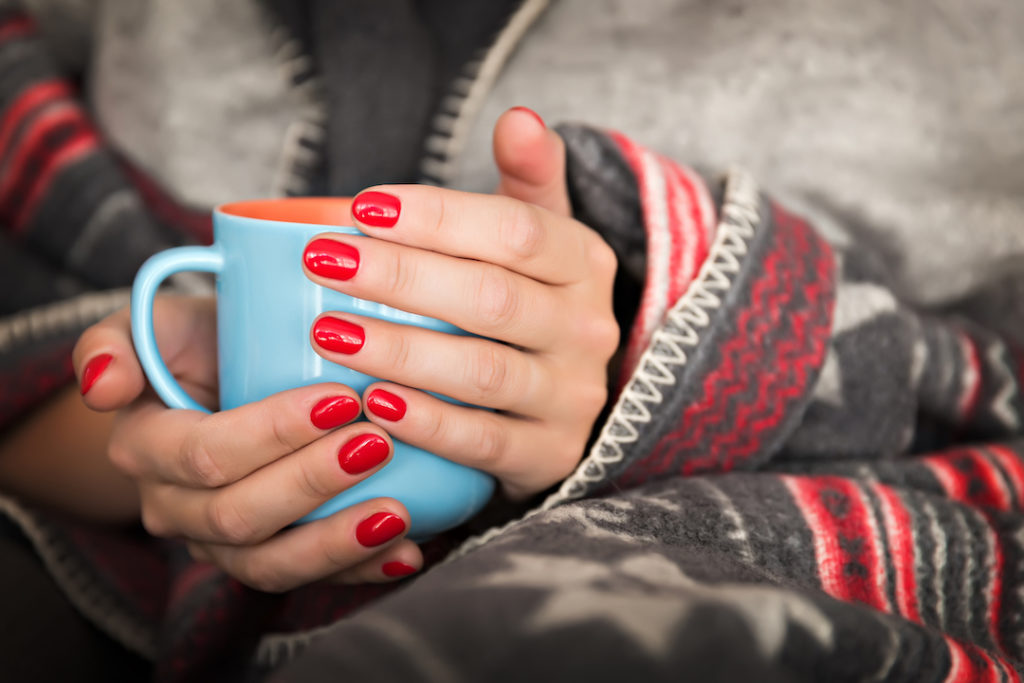5 Reasons You Feel Cold All The Time
September 6 2019
The warm spring weather is moving in but if you’re still cranking up the heating or putting on another thick layer, one of these health issues could be causing your big chill:
Low thyroid function
Your thyroid gland keeps your metabolism firing on all cylinders. “If it’s not making enough thyroid hormone, your metabolism slows down,” says Dr Sonia Davison, endocrinologist at Jean Hailes For Women’s Health. “Feeling the cold and suffering cold hands and feet are a common sign of an underactive thyroid.” Studies show that one in 10 Aussie women have thyroid issues without knowing it. If a blood test shows your thyroid levels are low, medication can bring it back into balance.
Skimping on meals or kilojoules
“When you keep skipping meals or eat a very low-kilojoule diet, your body can cut back on basic functions, such as producing body heat to stay warm,” says Professor Timothy Gill, Research Programs Director at Sydney University’s Boden Institute of Obesity, Nutrition, Exercise and Eating Disorders. Also called the “starvation response”, this drop in temperature indicates your body is burning less energy and your metabolism is idling on slow. “Do this over a period of weeks or months and you may risk slowing your metabolism permanently, which could cause weight gain,” Prof Gill says.
Anaemia
Do your feet and hands often feel icy, even when you’re in bed? Then low iron could be reducing your production of red blood cells, which help to store and carry oxygen around your body. As a result, your organs and tissues don’t get as much oxygen as they should. According to the Mayo Clinic, in the US, this can lead to cold hands and feet, as well as more classic anaemia signs, such as weakness, fatigue, shortness of breath and irregular heartbeats. “If you suspect anaemia, see your doctor to have your iron levels checked,” says Dr Brian Morton, spokesperson for the Australian Medical Association.
Sleep issues
Have you been struggling with insomnia or hitting the hay at 2am after binge watching a series on TV or Netflix? Then your circadian rhythm may be out of whack and your body clock set to the wrong time of day. If you’re in sync, your body temperature should rise in the morning and then drop at night to help you get to sleep. “Research shows that just one night of sleep loss led people to have cold hands the next day,” says Dr Alex Agostini, from the Sleep and Chronobiology Laboratory at the University of South Australia. “If you’re out of sync with night and day, your lowest body temperature could be occurring during the day and this can make you feel cold.”
Circulation problems
Sluggish circulation can slow your bloodflow to extremities like hands and feet. “This can be caused by a range of health conditions, including heart problems, diabetes and Raynaud’s syndrome, where arteries go into a spasm when you become stressed or cold,” Dr Morton says. “If you feel the cold constantly or have feet and hands that feel numb, chronically cold or appear white or blue, see your doctor.”
—
Sourced from Prevention.
—
For medical consultations, call to schedule an appointment with us at 03 5229 5192 (Myers Street Family Medical Practice), 03 5241 6129 (The Cottage Medical Centre), 03 5264 8838 (Torquay Medical Health & Wellness Clinic). For Corporate Care Program, visit Workplace Health & Safety Victoria.
